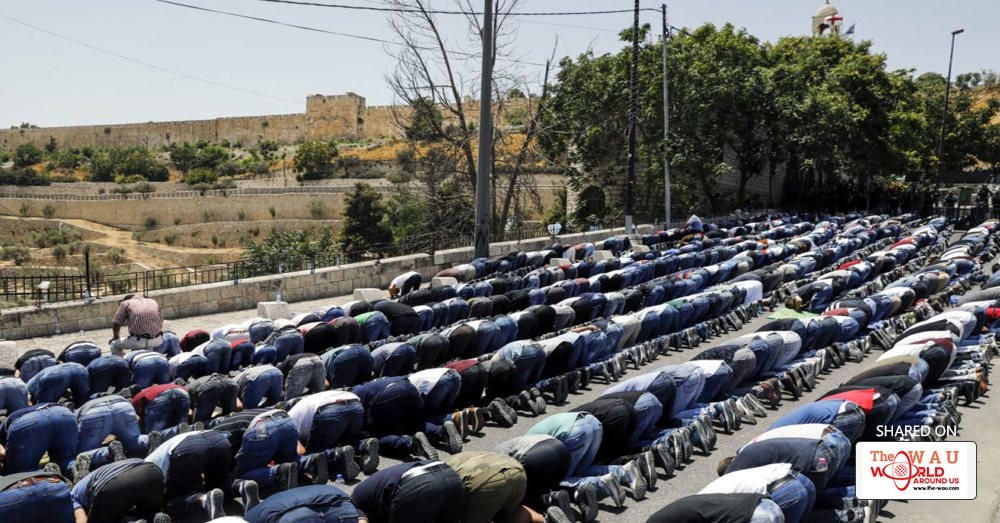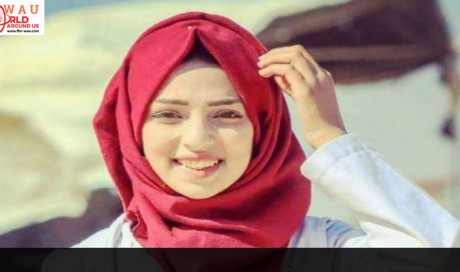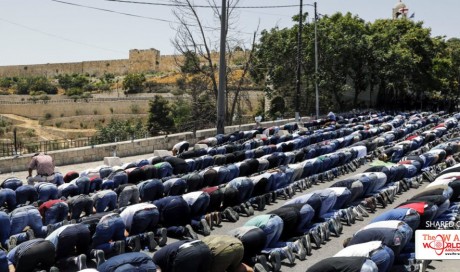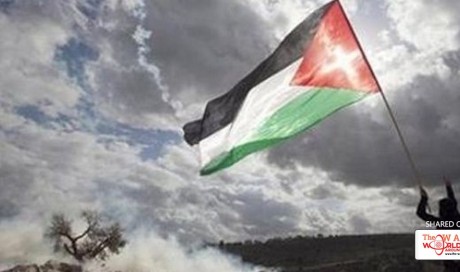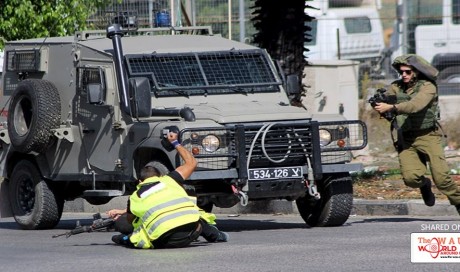Israel barred men under 50 from Friday prayers at a sensitive Jerusalem holy site after two weeks of tensions and deadly unrest, leading thousands of Palestinians to hold mass prayers outside.
Thousands of others entered the Haram al-Sharif compound, known to Jews as the Temple Mount, for prayers after Palestinians ended a boycott of the site the previous day.
Despite fears of violent clashes around the compound, which includes Al-Aqsa mosque and the Dome of the Rock, the area was largely calm following Friday’s midday prayers.
Shouted
Dozens of young Palestinians shouted and protested near one entrance to the compound and minor scuffles broke out with police.
Clashes did however erupt between Israeli forces and Palestinians in parts of the occupied West Bank, including in the Nablus, Bethlehem and Hebron areas, the Israeli army said.
A Palestinian also tried to stab soldiers at a junction in the West Bank and was shot dead by Israeli forces, the army said.
And Israeli troops shot dead a Palestinian teenager and wounded seven others during clashes near the border fence in Gaza, Palestinian authorities there said.
The Palestinian Red Crescent said 225 Palestinians were wounded, including at least 87 from live or rubber bullets.
Tensions at the holy site were high — even after thousands of worshippers returned to the compound Thursday, ending a boycott over new security measures set up following an attack that killed two policemen.
The outside prayers on Friday were due to the Israeli age restrictions and were not the start of a new boycott, after Israel removed the security measures this week.
By the evening, the gates to the mosque compound were open and Palestinians of all ages were allowed in without any restrictions, an Israeli police spokesman and a Palestinian official said.
Police earlier barred men under the age of 50 from praying amid fears of disturbances.
Roads around Jerusalem’s Old City, where the mosque compound is located, were closed and some 3,500 police were deployed. Police said people who tried to stay inside Al-Aqsa mosque overnight were removed.
“It is a cowardly act,” Amjad Hassoun, a young man from Jerusalem, said of the age restriction.
At least 187 people were wounded inside the mosque compound and in adjacent areas as clashes erupted on Thursday, the Red Crescent said. Police said stones were thrown at officers.
Amnesty International said Israeli security forces fired “stun grenades, tear gas and sponge-tipped bullets into a peaceful crowd” at an entrance to the compound.
Tensions
The United States lauded “the efforts undertaken to de-escalate tensions in Jerusalem”.
Jordan, the custodian of Jerusalem’s Muslim holy sites, welcomed the removal of the security measures but said Israel should not provoke Palestinians there.
“Unless Israel acts responsibly, then we’ll be facing another crisis that will push us all towards the abyss,” Jordanian Foreign Minister Ayman Safadi said.
Deadly unrest had erupted in the days after the new measures were introduced, with clashes breaking out around the compound, and in the West Bank, leaving six Palestinians dead.
A Palestinian also broke into a home in a Jewish settlement in the West Bank and stabbed four Israelis on July 21, killing three of them.
Israel removed the metal detectors on Tuesday after intense international diplomacy.
Newly installed railings and scaffolding where cameras were previously mounted were also removed on Thursday.
The removal was seen as a defeat for Prime Minister Benjamin Netanyahu, who had ordered the security measures and was forced to backtrack after warnings the unrest could spiral out of control. It represented a rare victory for Palestinians, who remained united in their boycott.
Israeli officials said they were to replace the new security measures with “advanced technologies” — widely believed to be smart cameras with facial recognition technology.
The holy compound lies in east Jerusalem, seized by Israel in the Six-Day War of 1967 and later annexed in a move never recognised by the international community.
The third-holiest site for Muslims and the most sacred for Jews, it is at the heart of the Israeli-Palestinian conflict and has served as a rallying cry for Palestinians.
In 2000, a visit to the compound by then Israeli opposition leader Ariel Sharon helped ignite the second Palestinian intifada, or uprising.
Jordan will not allow the return of Israel’s ambassador until the shooting of two Jordanians by an embassy security guard has been properly investigated, a government official said on Friday.
“Jordan will not allow ambassador Einat Shlein or the rest of the embassy staff to return until a thorough investigation has been opened” into Sunday’s shooting, the official said, adding Jordan informed Israel of its decision.
Israel’s foreign ministry late Friday said it had launched a “verification procedure” into the shooting.
Israel’s attorney general “gave instructions to implicated (Israeli) bodies to provide all elements in their possession concerning the incident”, a ministry spokesman said in a statement.
“Israel will inform Jordan of developments and information gathered during this procedure,” the spokesman said, without providing further details.
Hundreds of Jordanians held a protest earlier Friday near the Israeli embassy in Amman, calling on the government to shut it down, expel the ambassador and cancel the 1994 peace treaty with Israel.
Emerging from a mosque hundreds of metres (yards) away from the embassy, the protesters chanted “Death to Israel” and “No Zionist embassy on Jordanian soil”, an AFP correspondent said.
On Thursday, King Abdullah II called on Israeli Prime Minister Benjamin Netanyahu to try the guard, who travelled home on Monday night with other embassy officials after being briefly questioned by Jordanian investigators.
The guard was welcomed home and greeted as a hero by Netanyahu, who embraced him and said: “You acted well, calmly and we also had an obligation to get you out.”
Israel maintained the guard had diplomatic immunity.
Share This Post

